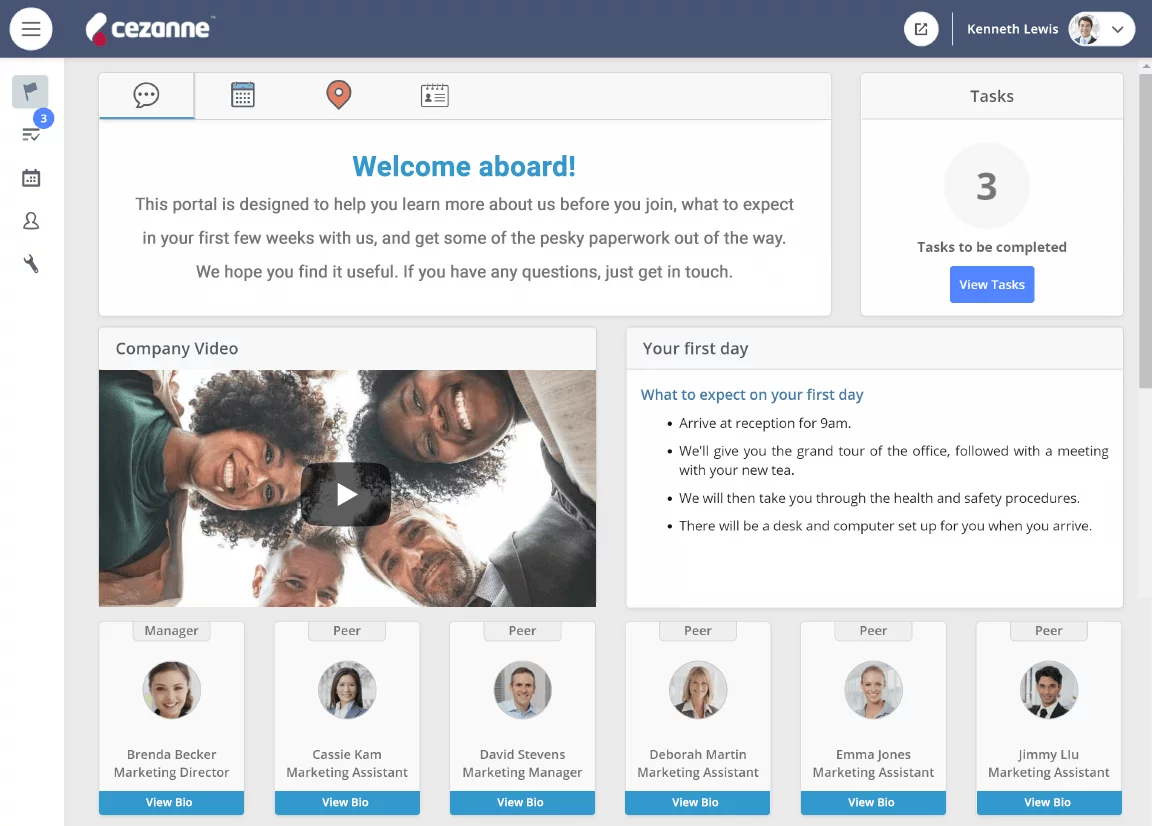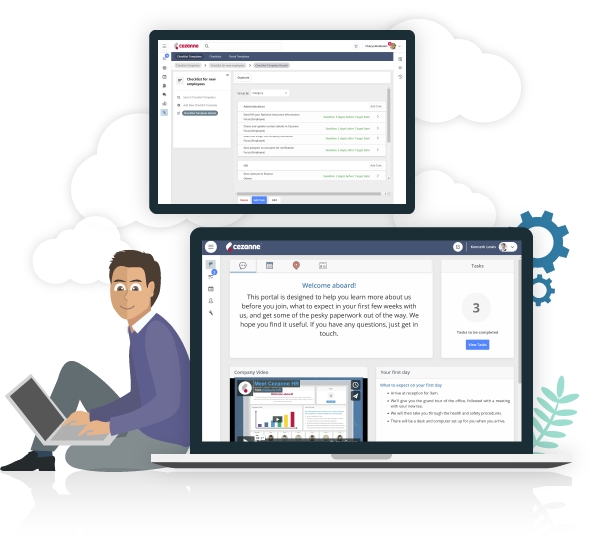What is onboarding software?
Onboarding software is HR management software designed to better engage new hires before they start and streamline the HR administrative tasks associated with bringing a new employee into the company by automating the flow of data and activities. They help businesses deliver an engaging experience that promotes the organisation culture, builds trust and fosters commitment.
Either available as an integrated onboarding module for an HR software system or as a stand-alone application, the best onboarding software saves time, ensures important activities don’t get overlooked, and connects new employees with their new employers and colleagues in a positive and lasting way.

Business benefits of onboarding software
Why you need onboarding software
Badly managed new joiner processes leave new staff feeling disengaged and dissatisfied, which represents a huge cost to the business. Successfully onboarding new joiners has been shown to strengthen relationships between employees and their employers, improve staff retention and boost productivity and collaboration.
Onboarding systems also dramatically reduce HR administration overheads and help improve compliance by automating many labour-intensive processes, saving time and helping to ensure key activities don’t get overlooked. These can range from distributing and tracking essential paperwork to notifying others, such as IT, facilities managers or finance departments of activities that need to be completed before – and after – a new employee starts.

3 Key features to look for in onboarding software
1. Welcoming onboarding portals
First impressions are essential, so it’s important to make sure that your welcome portals not only look good but can be quickly and cost-effectively tailored to reflect your brand, and deliver content your new joiners will appreciate. These are the features to look out for:
-
Own branding
With the option to easily upload your own logo and images.
-
Essential information area
For key information, such as start date, primary contact, office location and arrival instructions.
-
Configurable content areas
Where you can easily add or rearrange pictures, video or text content.
-
Staff bios
Automatically displayed photos and profiles of their future manager and peers.
-
A dynamic ‘to be completed’ task area
A space where employees can easily see and action their key tasks, such as documents to sign or read, or information that needs to be completed.
-
24/7 online access
To ensure the widest possible adoption, make sure your portals can be accessed online at any time from the device of choice.
-
Option to create multiple portals
So you can reflect the information that’s appropriate to different roles or locations.
-
Support for international requirements
With the option to easily upload your own logo and images.
-
Option to accommodate different lifestyle events
For example, to help with relocations, promotions, seasonal staff or employees returning from maternity/paternity or extended sick leave.

We finally have an interactive on-boarding process, also a central location for all personal information to be stored which is quite important with GDPR.
ByrneLoobyΔεκέμβριος 2019
2. Automated task management
Research shows that when it comes to onboarding, companies are still missing essential steps, like right to work checks, or arranging for appropriate desks, chairs and technology to be in place. This puts the business at risk, and leaves new employees feeling unappreciated. Top onboarding software comes with embedded task management that ensures activities aren’t missed. Features to look out for include:
-
Task list templates
The option to easily set up a library of task templates covering all your standard new joiner and employee life cycle activities (such as promotions or relocations) that you can pick from and amend if needed, so you don’t have to start from scratch each time.
-
Automatic notifications
Kicking off one of your templates should automatically triggered emails and update task inboxes, so everyone involved know what’s expected of them, and when they need to have completed their tasks.
-
Smart task allocation
With the option to allocated activities against an individual (e.g. the new employee’s manager) or a team (for example, IT or Finance). With teams, it’s important that one person in a team can take control of a task, whilst other team members are informed that they no longer need to act.
-
Control dashboards
An easy to use, central area that allows HR to track progress and have an overview of all completed and outstanding tasks, so they can keep an eye on the progress and chase up if needed.
3. Easy integration with HR data
Smooth onboarding relies on presenting the right information and activities to the right people at the right time – whether that’s routing data and documents through an approval and signing process, or ensuring new joiners have accurate information about key contacts or team bios.
That means that you’ll need to consider carefully whether to select a stand-alone onboarding system, or opt for one of the modern Cloud HR systems that have onboarding built in. The main benefits of an integrated HRIS and onboarding system are:
-
Real-time data accuracy
Changes made in your core HRIS, for example a change of role or update to team profiles, are automatically reflected in your onboarding system.
-
Single source of data
All information is held centrally, and only needs to be entered once.
-
Smoother processes
Making use of your existing HR data lets you take advantage of the data and reporting relationships you already have, helping to ensure tasks and notifications reach the right people at the right time.
-
Familiar interface
With just a single system to use, it’s easier for participants to complete activities and for HR to see the bigger picture.
The Pschology of Onboarding: Optimising the new starter experience
What do HR teams need to know about onboarding new employees in today’s digital world of work and how can technology help? Download our expert white paper or contact us to arrange your no-obligation online demo of Cezanne HR’s leading Cloud HR system for HR management and employee onboarding.
Get whitepaperBook a demo
Making the case for software
Employee onboarding software lets HR teams take control over a process that far too often doesn’t deliver the outcome that either the business or the new joiner anticipates. And, with the cost of modern integrated Cloud HRIS starting from just a few pounds per employee per month, sophisticated onboarding software is available to organisations of every size.
Onboarding is just one of many areas where HR software can help streamline and improve people management. By taking advantage of modern Cloud solutions to automate other key human resources management processes, such as absence and holiday management, performance reviews, recruitment and timesheets, HR teams can free up time and help the whole business work smarter.
